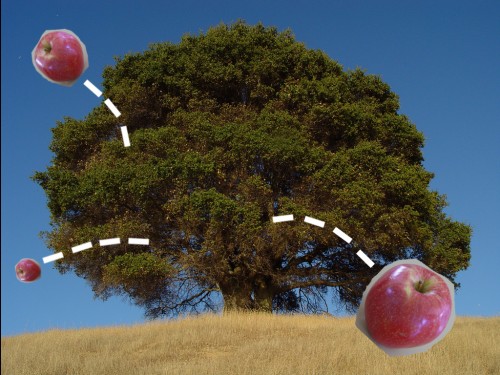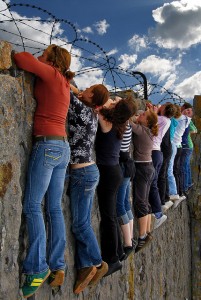Apples in the oak tree. Posted by hulda on Apr 24, 2014 in Icelandic culture, Icelandic customs, Icelandic grammar, Icelandic history
Happy Sumardagurinn fyrsti, First of Summer, everyone! Easter is almost over now, the lamb’s eaten, Easter beer gone, the chocolate eggs opened and now the only thing left to do is to try to understand the proverbs that the eggs gave you. One of you, dear readers, asked me about a particularly difficult proverb which prompted me to write this whole entry as a reply because there’s is simply no short and easy way of explain what the proverb in question means and why it’s written in such a difficult form.
Icelanders take their Easter eggs seriously, and by this I mostly mean the sizes that range from large to diabetes ahoy. They’re filled with all kinds of yummy surprises but among them is one thing that people like to fish out first before they even begin to eat the candy: the Easter proverb. Families have somewhat different routines with these but f.ex. in ours the ritual begins with selecting your own egg, choosing your own fate blindly so to speak.
Reading the proverb out aloud and trying to figure out what it means is a favourite pastime around the Easter celebrations. If no one can tell what they think it means the thesauruses come out and after that the last call for help goes on social media sites. But wait, aren’t we talking about Icelandic proverbs here, as in they’re written in Icelandic and should therefore be understandable, at least on some point, to everyone?
NOPE.
Icelanders have such a long literary history that yields content to these eggs that some of the proverbs have turned… mysterious. They may include words that are so archaic that no one has used them for a long time, and some have already been left out of even the thesauruses. They may also be deliberately confusing, or are written in a manner where poetic form is favoured over accuracy.
“Allar elkur hafa einhverja rót” that my friend received is a brilliant example of the archaic language problem. The word “elkur” can no longer be found in dictionaries or thesauruses and since it’s the key of the whole proverb – “every _____ has some root” – you won’t understand it without first translating the word. We threw around some wild guesses for a while until someone who owned an old Icelandic thesaurus found out that the word means “hindrance/obstacle”. The meaning of this proverb would be “all obstacles have their cause”, every trouble in life has its roots, or grew to be because of something that brought them into life. Many Icelandic proverbs subtly direct your gaze to your own self and the results of your own actions rather than blaming the outside forces alone, in this case the obstacle.
Mine also included an old Icelandic word: “Ástsæll er ólatur maður“. Ástsæll, although not as obscure a word as elkur, is no longer in use outside of books. It could possibly be translated as “love-blessed” although its correct, modern translation is “popular”. Therefore the proverb itself translates as “Popular is the hard-working person”. I will do my best, Easter proverb!
Of the deliberately confusing ones the following one might be the best known: “Sjaldan fellur eplið langt frá eikinni” (= the apple rarely falls far from the oak tree). My first reaction upon hearing this one was wonder. How does an apple end up in an oak tree? Why would it fall from there, was it not properly secured? How is it so certain that it doesn’t fall far away, there could be wind, or swallows mistaking it for a coconut*?
The answer is that this proverb is not Icelandic of origin, rather a translated one: “apple doesn’t fall far from the tree”. The tree turned into an oak for no better reason than the fact that according to old Icelandic metre in poetry oak tree rhymes with apple. They both begin with the same sound and coincide on stressed syllables, it just wouldn’t sound as good otherwise – logic be damned, oak tree it is.
However, in difficulty of the proverb that was sent to me via the blog comments stands out on a level of its own.
“Sá er drengur sem við gengur.”
If you were to translate this with the help of a dictionary you’d most likely come to the conclusion that it means something like “a real man walks beside you” which, alas, is not even close to correct.
“Drengur” here does not actually mean a man by gender but a human in general, just like the word “man” does in English. If the word stands alone that’s all it means, but what we aren’t told here is that in this proverb it’s actually shortened from “góður drengur“, a phrase that loosely translates as “a decent human being”. The lack of the adjective is just poetic licence and the proverb assumes you already know the phrase and can therefore add the missing part yourself, which alas does not happen before you have a really good grasp and almost full fluency in not only the language but the culture and literary history as well. You’re by no means alone in this, language learners, I discussed this proverb with several Icelanders and only two could tell me what it means**.
Another trap in the proverb is the use of the verb “ganga“, because here it doesn’t mean walking at all. Again something important has been omitted for the sake of proper rhyme – the latter part is actually “að gangast við einhverju“, to admit and accept one’s own responsibility in matters. What this proverb actually means is “a decent human being accepts their own responsibilities”.
Here are even more proverbs of the same type, the kind that has some form of inbuilt rhyme. Can you spot them all? Hint: remember that alliteration is the key in Icelandic poetry (although other forms of rhyming do exist as well, sometimes even in the same poem) and that all words that begin with a vowel rhyme with each other.
Did you receive an Easter egg proverb you couldn’t translate? send me the text in the comments section and perhaps I can help out with it. 🙂
* If you get the reference I will automatically count you as my friend.
** Many thanks to Mr. E and Mr. H!
Photos used in this entry: oak tree by Franco Folini, apple by idpams, “beyond the wall” by Giuseppe Bognanni, “whoops” by Bill Mill.
Today’s recommendation is Hera Hjartardóttir, a woman of amazing voice. Despite living a large part of her life in New Zealand she has strong ties to Iceland and has written and performed music for f.ex. the movie Hafið. She began her career at age 16 with a home recorded album called Homemade.
It feels so good (link)
Stúlkan sem starir á hafið (link)(song originally by Bubbi Morthens)
Feathers in a Bag (link)

Build vocabulary, practice pronunciation, and more with Transparent Language Online. Available anytime, anywhere, on any device.
About the Author: hulda
Hi, I'm Hulda, originally Finnish but now living in the suburbs of Reykjavík. I'm here to help you in any way I can if you're considering learning Icelandic. Nice to meet you!








Comments:
Margrét:
I got one of those new silly, terrible ones made up by the chocolate company: Oft finnst súkkulaði undir páskaunga, or something like that.
P.s. I don’t get the coconut reference, but I’m very curious.
hulda:
@Margrét Oh those – I always feel a bit disappointed when I get a “supposed to be funny” text instead of a proverb. They’re just not the same!
(The reference hints at a movie that once opened my eyes to the greatness of the art of cinematography. 😉 )
Marcia:
We should be friends, then! I love the meaning of life! Hahaha.
And I laughed so hard with this post.
Thank you so much.
*hug*
Marcia:
@Marcia Shit, I messed up, it’s not that one, but I remember that part, and the rabbit one. I’m going to go watch it right know, it makes me laugh so bad.
What about A DUCK?
hulda:
@Marcia Hahahahaha it’s ok friend, it still counts! 😀
*hugs back*
Sophia Papachristos:
Hello there,
I’ve indeed got an Easter egg from Island as a gift from a friend who has been there on holiday.
Now I have the following proverb I can’t find a translation for:
pað er til litils að hlaupa ef stefnt er i skakka att
Could you please be so kind and help me?
Thanks in advance because I’m either way totally lost.
Best regards,
Sophia
Sophia:
Hello there,
I’ve indeed got an Easter egg from Island as a gift from a friend who has been there on holiday.
Now I have the following proverb I can’t find a translation for:
pað er til litils að hlaupa ef stefnt er i skakka att
Could you please be so kind and help me?
Thanks in advance because I’m either way totally lost.
Best regards,
Sophia